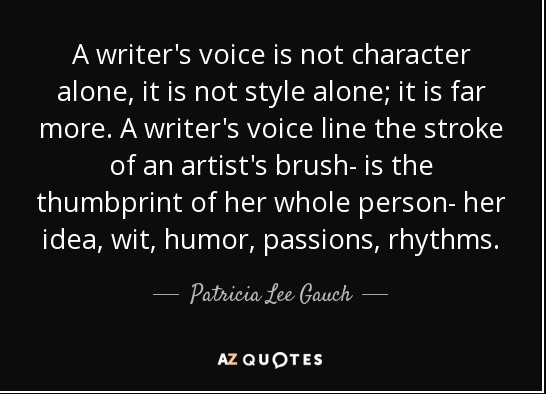Writers hear over and again about the strength or lack of voice in their manuscript. (Hopefully, the former.) In non-fiction, it is generally the author’s voice that is praised or lacking. In Non-Fiction, it could be the author’s voice or the character’s voice. There is a difference, and both are important; however, when a critique partner, agent, or editor say VOICE, they typically mean something very personal – your writing.

The author’s voice conveys how s/he sees the world. How experiences have shaped their view. How you feel about the topic influences your writing. The tone of your words, how you say things, your word choice, and syntax are just as important as what you say. The writer’s or author’s voice is more overt in a third person or omniscient narration, but the author’s mood, worldview, and writing style are also present in first and second person POVs.
Typically, an author’s voice is consistent throughout their works. Of course, voice reflects the era, location, and dialect of the piece, but it still represents your view and influences.
Would you recognize Hemingway? Shakespeare? If yes, then you know their voice. You need to know YOUR voice and hope that others will someday recognize it. Voice needs to be studied and perfected through practice.
In contrast, the character’s voice is often displayed through syntax and vocabulary but should also be exhibited in actions, body language, facial expressions, and relationships. Each character should stand out as being as individual as any person you might meet on the street, memorable in their own right.
The character’s voice conveys their unique personality, life circumstances, attitude, and point of view. Which, of course, will be flavored by the author’s experiences. After all, they are your creation. However, they should never be dominated by the author’s voice. The characters need to have their own interpretation of the world around them.
Authorial voice and character voice are not the same thing. Although your authorial voice will inevitably color everything you write, you will also need to adjust it to properly represent the varied characters you are bringing to life for your readers….you must also take into account the setting that has shaped your characters, as well as the times in which they live.
Writing Voice: 6 Things You Need to Know to Improve It – Helping Writers Become Authors, K.M. Weiland, July 17, 2017.
Take the time to really study your voice. Is it in sync with your desired audience? Will it resonate with readers? Is it authentic? Are your character’s voices autonomous? Know thyself. It’s a valuable exercise.
Do you know your voice? How have you exercised or refined it over the years? Please share your experiences with perfecting your VOICE.


Very helpful. I have always been a bit confused about what my “voice” was.
LikeLike
Thank you, Marti, voice can be so tricky!
LikeLike
The ever elusive voice! Thanks for this post, Marti!
LikeLiked by 1 person
Thanks for the reminder. Voice has been something I struggled with early on in my writing but now it is easier. Sometimes we lose our voice trying to please.
LikeLiked by 1 person
I agree. It’s also something to remember as we critique others work. We need to allow the voice to ring true.
LikeLike
Excellent reminder!
LikeLiked by 1 person
Great article. Very helpful to me for my writing.
LikeLiked by 1 person
Thank you, Marti. This is really good for me to reflect on as I work on my first middle-grade novel. I’m using a 10-year-old boy as my first-person narrator, so it’s really important that I capture his voice in every part of the story. It is challenging at times, but a lot of fun.
LikeLiked by 1 person